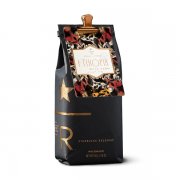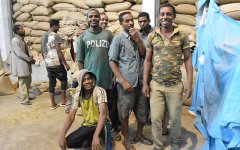Ethiopia Coffee Estate Summer Village Garden Story-Go back to Ethiopia to find the source of summer

For professional baristas, please follow the coffee workshop (Wechat official account cafe_style)
Before meeting Willem Boot, the owner of La Mula in Panama, Adam Overton had only a vague dream of buying a farm in Ethiopia to grow the world's most delicious coffee Geisha.
Why Ethiopia? Because Ethiopia is said to be the native place of rose summer, the seeds of rose summer were brought out from the depths of the local primeval forest and moved to Panama last century. It was not until early 2000 that it became an amazing coffee. Another thing is that his wife Rachel Samuel is Ethiopian.
Adam has no experience growing coffee. He works as a documentary filmmaker and Rachel is a professional photographer. They were commissioned to shoot coffee documentaries in Ethiopia in 2007. From then on, I fell in love with coffee and wholeheartedly wanted to buy a coffee garden.
They met Willem Boot in 2009, three years after Willem Boot bought La Mula, a Panamanian estate, to grow rose summer. In order to learn from the experience, the couple flew from the Ethiopian capital to Panama and went to Donkey Manor to ask Willem Boot for help. At that time, no one knew that the small estate of La Mula would shine in the "Best Panama" competition in five years' time.
But at that time Willem Boot was already known for its pursuit of the Ethiopian source of summer. Since the appearance of Rose Summer in Best Panama in 2004, he has been hoping to find the origin of Rose Summer from the vast primeval forests of Ethiopia, and has organized several explorations to explore places that have never been explored, although the results are limited. But he kept on trying and never gave up.
Why is it so important to go back to Ethiopia and find the source of Rose Summer?
For Willem Boot, if we can find coffee with the same flavor as the Panamanian rose summer, it means that under the threat of global warming, we are expected to find coffee varieties with both disease resistance and superior flavor, which is of indescribable importance to the future survival of coffee.
Learning from Willem Boot, the dream of the Adam couple is a major turning point, and they are more determined to build their own Rose Summer Manor. Since they live in Addis Ababa, the capital of Ethiopia, at first they want to find a closer place, it is easier to find labor, the transportation is also convenient. But to meet the conditions for growing rose summer, taking into account altitude, microclimate, all other conditions, unwittingly farther and farther away, and finally came to the most remote southwest of Ethiopia, bordering the border with Sudan.
The area is Bench-Maji, a two-day drive from Adis Addis, and there are several nearby villages called Rose Summer, which is also the legendary most likely place of origin. Bench-Maji was independent and rarely entered by outsiders, and the situation did not improve slightly until the road was opened up a few years ago. The local Meanit aborigines have their own language. To all outsiders, they call it China!
The Adam couple, accompanied by the locals, climbed to the mountains. As soon as they saw the place, they immediately fell in love with the land-1900 to 2100 meters above sea level, abundant rainfall, suitable temperature patterns, rich undeveloped primeval forest soil, exposure to the long-standing coffee growth ecology, with ancient coffee trees. After three years of searching, I finally have a foothold in this dream land. They chose a simple name: "Rose Summer Village Manor" (Gesha Village Coffee Estate).
When the farm broke ground in October 2011, Willem Boot, their consultant, flew to the manor and saw more like a camping prairie than a thriving farm. In order to guard against incoming lions, watchtowers were built on the farm to sound the alarm early. To explore the forest, you need to be equipped with AK 47 rifles, guard against ferocious wild animals, and be accompanied by aborigines with spears.
But at about the same time, there was a breakthrough in finding suitable varieties for planting. Willem Boot and Adam found in a primeval forest not far from the manor that the shape of the wild rose summer was very similar to that of Panamanian rose. regardless of the growth shape of cherries and branches, the growth of shade trees was deeply concealed, thousands of coffee shrubs were in full bloom, and the air was filled with unbelievably strong jasmine fragrance. Willem Boot recalls that he was "in heaven" at that time!
The forest they found is called Gori Gesha Wild Coffee Forest, just 20 kilometers from the manor, and Adam believes it is the same source collected by the famous Panamanian summer of 1930. Willem Boot also believes that these tree species are very similar to the rose summer he planted in La Mula, which has green and brass leaves. In February 2012, Willem Boot returned to the manor, and the Rosa variety of the manor was finally finalized.
For Willem Boot, however, morphological similarity is not enough. He needs more accurate scientific evidence: genetics. He asked Dr. Sarada Krishnan of the Denver Botanical Garden in the United States to compare the coffee beans found in the rose summer forest with the rose summer in Panama. Krishnan spent nine months comparing the two species of Rosa rugosa and concluded that the two genes were highly similar.
At present, the "Rose Xia Village Manor" in Adam has 300 hectares, and there will be an increase of 50 hectares next year. The planting of rose summer from nearby forests and other places is maintained at a density of only 2000 trees per square hectare. In the first three years of the establishment of the manor, 30, 000 shade trees were planted, which not only allowed the coffee trees to grow better, but also maintained rich biodiversity and allowed the native species Rosa to grow freely in it. The treatment methods are washing and insolation, and the washing is treated by an environmentally friendly Penagos washing machine.
In 2015, when the village of Rosa in Ethiopia was harvested for the first time, with unease, they took the first batch of processed raw beans and sent them to Willem Boot Cup for testing. The result of the cup test turned out to be the best cup Willem Boot has tried all year!
In 1931, a rose summer was taken away from Ethiopia to blossom and bear fruit in a foreign land. 85 years later, a documentary filmmaker with a dream has rediscovered the hometown of this rosy summer, and the world will have a chance to get to know the rosy summer back to Ethiopia.
Important Notice :
前街咖啡 FrontStreet Coffee has moved to new addredd:
FrontStreet Coffee Address: 315,Donghua East Road,GuangZhou
Tel:020 38364473
- Prev

Starbucks preferred Coffee\ selected Coffee\ Collection Coffee Ethiopian Bita Manor Coffee
Professional barista exchanges please follow the coffee workshop (Wechat official account cafe_style) Collection Coffee-Ethiopia Bita Manor STARBUCKS RESERVE ETHIOPIA BITTA FARM Flavor Notes: bright red fruit, ripe bananas and bitter sweet chocolate flavors description: bananas and chocolate suitable food: banana bread, chocolate sour
- Next

Ethiopian Coffee Manor introduces the solarization of cocoa village honey in Darwin manor series
For professional baristas, please follow the coffee workshop (Wechat official account cafe_style) Darwin series is selected from Kokei Cocoa Village, the highest point in Haiba, Yegashefi District, Ethiopia. Haiba is between 19002100m, and there are nearly 4000 small farmers in the cocoa village. In this extreme plateau microclimate, the processing plants in the cocoa village where the small farmers concentrate their coffee are currently available.
Related
- Detailed explanation of Jadeite planting Land in Panamanian Jadeite Manor introduction to the grading system of Jadeite competitive bidding, Red bid, Green bid and Rose Summer
- Story of Coffee planting in Brenka region of Costa Rica Stonehenge Manor anaerobic heavy honey treatment of flavor mouth
- What's on the barrel of Blue Mountain Coffee beans?
- Can American coffee also pull flowers? How to use hot American style to pull out a good-looking pattern?
- Can you make a cold extract with coffee beans? What is the right proportion for cold-extracted coffee formula?
- Indonesian PWN Gold Mandrine Coffee Origin Features Flavor How to Chong? Mandolin coffee is American.
- A brief introduction to the flavor characteristics of Brazilian yellow bourbon coffee beans
- What is the effect of different water quality on the flavor of cold-extracted coffee? What kind of water is best for brewing coffee?
- Why do you think of Rose Summer whenever you mention Panamanian coffee?
- Introduction to the characteristics of authentic blue mountain coffee bean producing areas? What is the CIB Coffee Authority in Jamaica?

